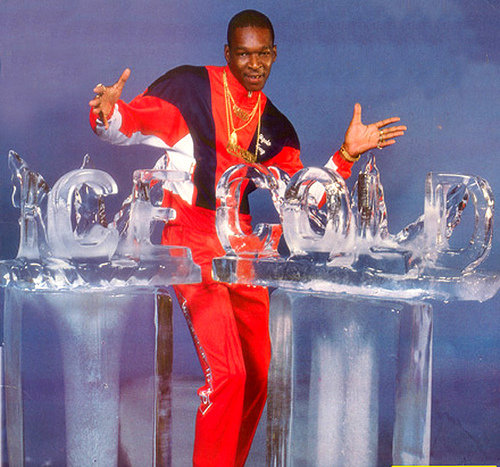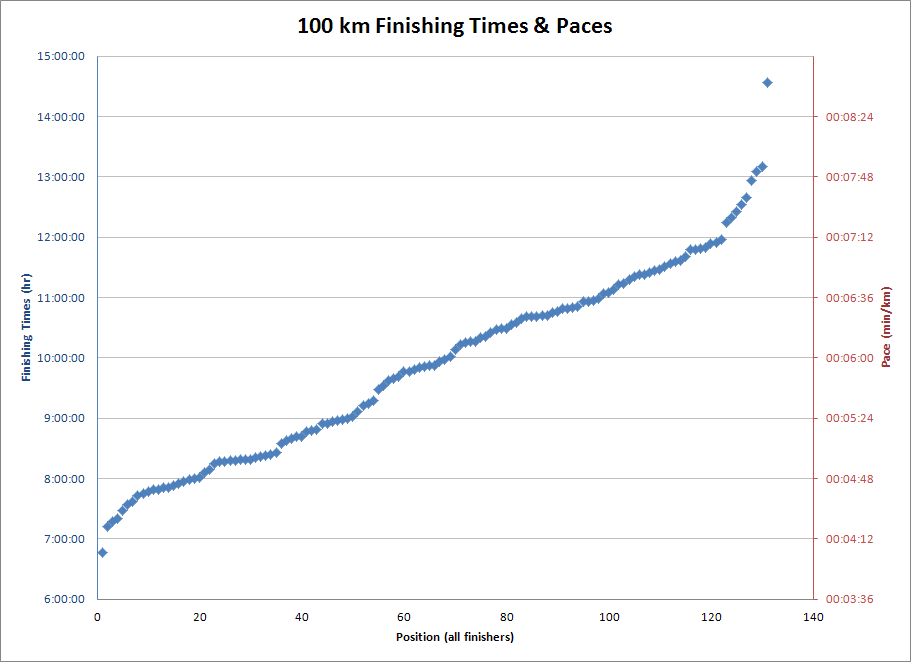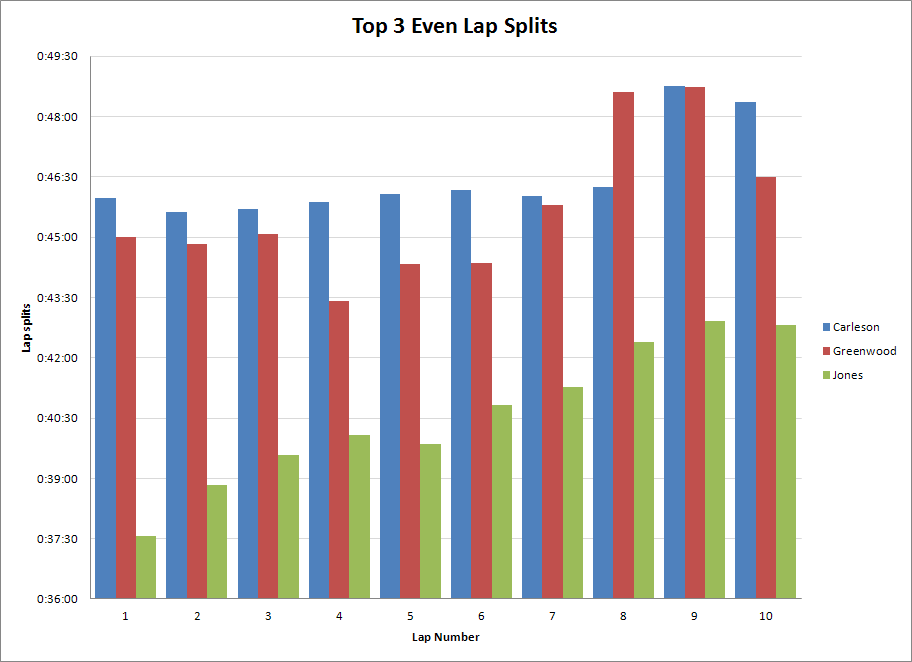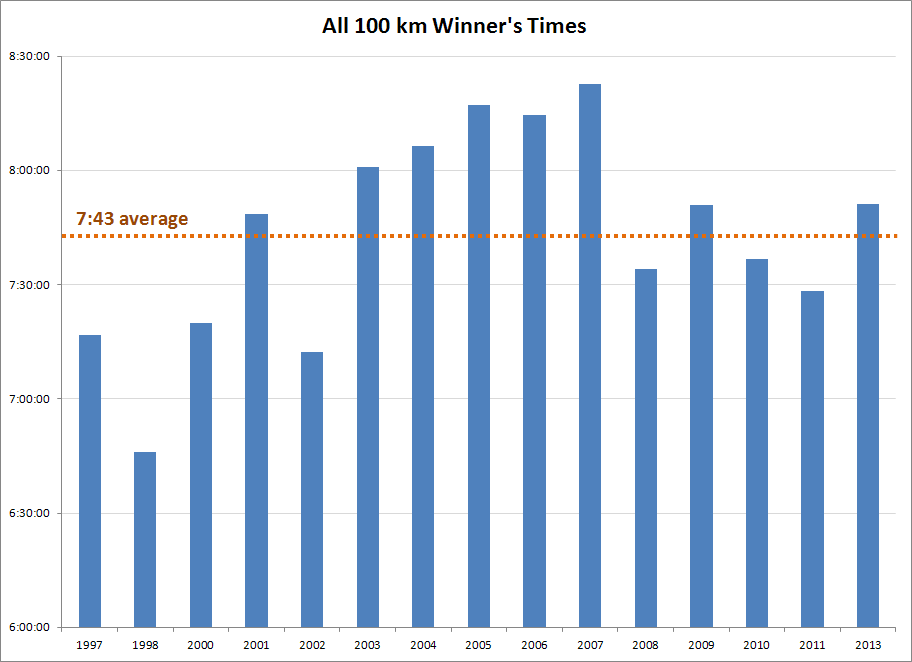My first 2014 race, on May 10th, will be the Elk/Beaver Lakes Ultra, just outside of Victoria, on Vancouver Island.
This is a dead flat, 100 km, 10 x 10 km loop race.
I thought I would do a little data analysis of that race, just to see what the situation is. (Since it’s a dead flat loop, there’s really nothing particularly interesting to write about, unfortunately.)
I tabulated all the finishers from all the years, into one big table, since it’s a pretty small race, and they have data all the way back to 1997 (except for 1999 , because the website didn’t have splits, and only 4 people ran anyway.) I ignored anyone who DNF’d, because unlike Leadville, a DNF here is very uninteresting, other than to indicate pure and utter failure.
Finishing Times:
In total, 131 people have completed the race. The finishing times varied from the course record of 6:46 (!) to just over 14.5 hours. Here is the chart of those finishing times:
That course record (6:46) by Andy Jones-Wilkins (AJW), one of the top ultra runners on the continent, is crazy, because the road 100 km world record is only 6:13 for men and 6:33 for women. Pretty freaking impressive. His 100 km best (6:33:57?) is apparently the Canadian soil 100 km record, too. So can we assume that running on gravel is roughly 0:12:00/6:34:00 slower? (That’s 3 %.)
That pace is a 4:04 min/km pace, on average! His best lap (the first, in 37:34) is faster than my best 10 km time! Cripes. That is almost two and a half 2:51 marathons in a row. Insanity. Completely irrelevant to the discussion at hand. (Although knowing what is possible is important.)
Split Inequality:
How about splits? Well, it’s not worth analyzing the whole data set, but here’s the graph three runners having the most even splits:
Split Inequality was measured by comparing the lap split to the average 10k split for the finishing time. Any deviation, high or low, was considered harmful.
They are pretty even for everyone. Don’t let the scale fool you. The guy who ran the most even splits of the entire race was M. Carlson, (2nd place in 2000, with 7:44:47, and 9th fastest overall). Over the entire race he ran roughly 46 mins per lap, other than the last two laps at 48 minutes. His total deviation was only 8:19, less than a minute per lap.
The next flattest run was was Ellie Greenwood, the women’s course record holder (and 7th fastest overall). You can see she had a few “really” fast laps (4, 5 & 6) and perhaps paid the price in the last couple. Again, we are talking pretty small errors here, her total deviation being just under 14 minutes over the course of a 456 minute race.
Finally, the 3rd flattest race, the record holder AJW, started with a very fast ~37 minute lap, but his average was ~40.5 and his last three laps were only ~42.5. Through the middle he’s losing maybe 10 seconds per km. Again, not a whole lot. It is interesting to note that this race shows a slow but consistent decline in pace. Probably when you’re running right at the limit it’s to be expected somewhat. As the day heats up, you might also expect slight reductions in pace for the same intensity. Or maybe he just went out too fast like everyone else.
Goal Setting:
Ok, so setting a course record is clearly out of the picture, so what other goals could I have? Well, I could try to win it, I suppose. Let’s investigate…
This is all the winners, minus the 1999 (10:28) and 2012 (9:51) winners, which were super slow outliers. The times vary from 6:46 to 8:23, with an average finishing time of 7:43 and a median of 7:48. The median seems like a good place to aim.
7:48:20 works out to 4:41 min/km (7:32 min/mi). Which is pretty freaking fast for 8 hours of running. I don’t know if I could handle that. Maybe if I had my shortest short-shorts on… My training long runs (currently a marathon) are pretty slow, although I finish easily enough at around 5:15 to 5:30 pace. I figure I can run 40 at 5:00 min/km (8 min/mi) pretty easily in training, so I suppose I could shoot for 100 at the same pace, but that would be painful. That would put me at 8:20 hrs. But could I knock another 20 seconds off? Let’s look at my last 80 km training run (yes, I realize that was 2 years ago). Hmmm, that was 80 at 5:51 min/km, but it was pretty hilly and meandering. So that should be very doable for 100 km.
A relaxed 5:30 min/km puts me at 9:10 hrs, so I may as well round down to 9 hrs. So maybe a reasonable set of goals would be:
- A+ dream: 7:48 (4:40 min/km)
- A goal: < 8:20 (5:00 min/km)
- B goal: < 9:00 (5:24 min/km)
- C goal: < 10:30 (Qualify for Spartathlon)
Remember, kids: C should be a given. B would make you happy, but should be fairly attainable. A is what you get if all is going really well, and the gods are smiling. The A+ dream goal is what keeps you up at night, and gets you out the door for a long run in the pouring rain.
If this was a primary race for me I’d shoot for sub-8, but I just don’t think my fitness is there… I have to also keep in mind that I don’t really wanna thrash myself in this race. I wanna finish the race easily enough and get right into hill training for Fat Dog after a short recovery month. So I have to be kinda careful, and chill. Sub-8 is definitely not chill.
Anyway, as we get closer to the race (still 1900 km of training to go!) I will be doing some longer runs, and much more speed work, and maybe 4:40 will seem less impossible. It would be super cool to come in under 8 hours, eh? Only 10 people have done that at Elk/Beaver Lakes. Of course winning would be even cooler than cool. What’s cooler than cool??



